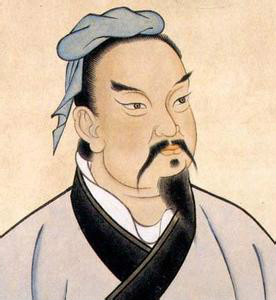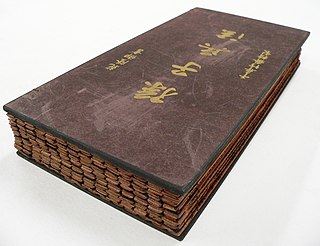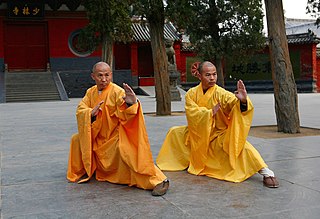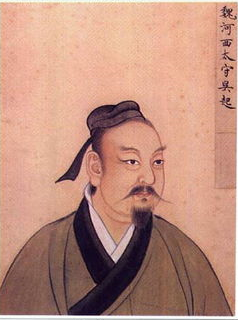The Art of War is a highly influential ancient Chinese military treatise attributed to Sun Tzu.
Contents
The Art of War may also refer to:
The Art of War is a highly influential ancient Chinese military treatise attributed to Sun Tzu.
The Art of War may also refer to:

Martial arts are codified systems and traditions of combat practiced for a number of reasons such as self-defence; military and law enforcement applications; competition; physical, mental, and spiritual development; entertainment; and the preservation of a nation's intangible cultural heritage.

Sun Tzu was a Chinese military general, strategist, philosopher, and writer who lived during the Eastern Zhou period. Sun Tzu is traditionally credited as the author of The Art of War, an influential work of military strategy that has affected both Western and East Asian philosophy and military thought. Sun Tzu is revered in Chinese and East Asian culture as a legendary historical and military figure. His birth name was Sun Wu and he was known outside of his family by his courtesy name Changqing. The name Sun Tzu—by which he is more popularly known—is an honorific which means "Master Sun".

The Art of War is an ancient Chinese military treatise dating from the late Spring and Autumn period. The work, which is attributed to the ancient Chinese military strategist Sun Tzu, is composed of 13 chapters. Each one is devoted to a different set of skills or art related to warfare and how it applies to military strategy and tactics. For almost 1,500 years, it was the lead text in an anthology that was formalized as the Seven Military Classics by Emperor Shenzong of Song in 1080. The Art of War remains the most influential strategy text in East Asian warfare, has influenced both East Asian and Western military theory and thinking, and has found a variety of applications in myriad competitive non-military endeavors across the modern world including espionage, culture, politics, business, and sports.

Chinese martial arts, often called by the umbrella terms kung fu, kuoshu or wushu, are multiple fighting styles that have developed over the centuries in Greater China. These fighting styles are often classified according to common traits, identified as "families" of martial arts. Examples of such traits include Shaolinquan (少林拳) physical exercises involving All Other Animals (五形) mimicry or training methods inspired by Old Chinese philosophies, religions and legends. Styles that focus on qi manipulation are called internal, while others that concentrate on improving muscle and cardiovascular fitness are called external. Geographical associations, as in northern and southern, is another popular classification method.
One or 1 is the first natural number.
Martial arts manuals are instructions, with or without illustrations, specifically designed to be learnt from a book. Many books detailing specific techniques of martial arts are often erroneously called manuals but were written as treatises.

Sun Bin was a Chinese general, military strategist, and writer who lived during the Warring States period of Chinese history. A supposed descendant of Sun Tzu, Sun was tutored in military strategy by the hermit Guiguzi. He was accused of treason while serving in the Wei state and was sentenced to face-tattooing and had his kneecaps removed, permanently crippling him. Sun later escaped from Wei and rose to prominence in the Qi state, serving as a military strategist and commander. He led Qi to victory against the Wei state at the Battle of Guiling and the Battle of Maling. Sun authored the military treatise Sun Bin's Art of War, which was rediscovered in a 1972 archaeological excavation after being lost for almost 2000 years.
The Seven Military Classics were seven important military texts of ancient China, which also included Sun-tzu's The Art of War. The texts were canonized under this name during the 11th century AD, and from the time of the Song dynasty, were included in most military leishu. For imperial officers, either some or all of the works were required reading to merit promotion, like the requirement for all bureaucrats to learn and know the work of Confucius. The Art of War was translated into Tangut with commentary.

The Wuzi is a classic Chinese work on military strategy attributed to Wu Qi. It is considered one of China's Seven Military Classics.
An omen is a phenomenon that is believed to foretell the future.
One Step Beyond is the fourth album from Australian heavy metal band Dungeon. It was released in Australia in November 2004 by Metal Warriors and in Japan at the same time by Sound Holic. LMP released the album worldwide in February 2005. Unlike the albums that preceded and followed it, One Step Beyond featured the same artwork and track-listing in all markets where it was released. The Australian version was to contain covers of "Til the Living End" by Dokken and Queen's "The Hero" but Dungeon's German label LMP refused to allow them to issue an alternate edition and the tracks were later made available as downloads. LMP later issued a special edition for the US market that also included the band's self-produced 2004 live DVD.

The Six Secret Teachings, is a treatise on civil and military strategy traditionally attributed to Lü Shang, a top general of King Wen of Zhou, founder of the Zhou dynasty, at around the eleventh century BC. Modern historians nominally date its final composition to the Warring States period, but some scholars believe that it preserves at least vestiges of ancient Qi political and military thought. Because it is written from the perspective of a statesman attempting to overthrow the ruling Shang dynasty, it is the only one of the Seven Military Classics explicitly written from a revolutionary perspective.

Sun Bin's Art of War is a renowned Chinese treatise on military strategy that dates back to the Warring States period, an era of political instability and warfare in ancient China. It is credited to Sun Bin, who was believed to be a descendant of the famous military strategist Sun Tzu. Sun Bin served as a military advisor in the Qi state during this period and is said to have authored this piece on military tactics.
The Methods of the Sima is a text discussing laws, regulations, government policies, military organization, military administration, discipline, basic values, tactics, and strategy. It is considered to be one of the Seven Military Classics of ancient China. It was developed in the state of Qi during the 4th century BC, in the mid-Warring States period.
Wings are appendages used to create lift.

The Art of War is the fourth album by Swedish power metal band Sabaton.

The Wubei Zhi, also commonly known by its Japanese translated name Bubishi, is a military book in Chinese history. It was compiled in 1621 by Mao Yuanyi (茅元儀 Máo Yuányí; 1594–1640?), an officer of waterborne troops in the Ming dynasty. The Wubei Zhi contains 240 volumes, 10,405 pages, and more than 200,000 Chinese characters.
Fan commonly refers to:
Sun Tzu or Sunzi, was a Chinese military general, strategist, and philosopher credited as the author of The Art of War.